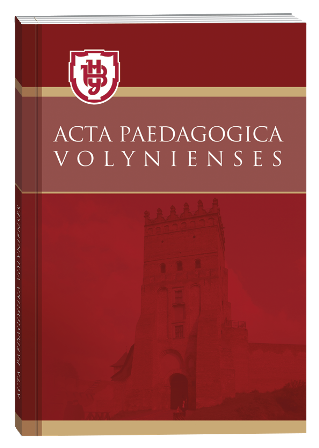INCLUSION IN THE PIANO TRAINING OF FUTURE TEACHERS OF MUSICAL ART: METHODOLOGICAL APPROACHES AND PRACTICAL ASPECTS
DOI:
https://doi.org/10.32782/apv/2025.1.33Keywords:
inclusion, music education, distance learning, piano, self-directed learning, pedagogical approaches, digital tools, inclusive methodologies, educational process, adaptationAbstract
The article examines the issues of inclusion in music education in the context of distance learning, in particular, using the example of piano training for future teachers of music. The relevance of the study is determined by the need to adapt music education to modern conditions, when distance learning is becoming an important component of the educational process. Inclusion in such a context includes not only the adaptation of educational materials for higher education students with disabilities, but also ensuring equal access to educational resources for all higher education students, regardless of their physical or social status. Particular attention is paid to the analysis of the difficulties that teachers face when organizing distance learning of the piano, such as limited feedback and difficulties in controlling performance technique.The possibilities of using modern digital platforms and specialized music applications that help overcome these difficulties are also considered. The main goal of the article is to investigate the features of organizing independent piano learning in distance learning, as well as to identify pedagogical approaches and digital tools that contribute to the effective learning of higher education students of different categories. In particular, the effectiveness of using video lessons, interactive tasks and virtual master classes is investigated, which allow adapting the educational process to the needs of each student.Separately, recommendations are considered for the implementation of inclusive methods in the process of piano training of future teachers of musical art, in particular, for the use of adaptive technologies and methods that meet the needs of higher education students in distance learning. The article also analyzes the social aspects of inclusion, in particular the importance of creating a supportive learning environment that promotes motivation and emotional comfort of higher education students. The results of the study show that the use of inclusive approaches allows creating conditions for equal access to education and the development of musical skills among higher education students with different abilities, which is an important component of modern music pedagogy.
References
Левочко, О. В. (2023). Шляхи реалізації інклюзивної освіти в сучасних закладах загальної середньої освіти. Retrieved from http://rep.knlu.edu.ua/xmlui/handle/787878787/3275
Антипін, Є. Б. (2022). Педагогічна антропологія : навч.-метод. посібник. Retrieved from https://elibrary.kubg.edu.ua/id/eprint/42492
Федоров, І. (2024). Інклюзивна освіта в Україні як важливий напрям реформування освітньої системи. Актуальні питання розвитку аграрних, технічних та еколого-соціальноекономічних сфер: зб. матеріалів учасн. ІІІ Всеукраїнської студентської науковопрактичної конференції. Бережани : ВП НУБІП України «Бережанський агротехнічний інститут», 416 с.
Носенко, Ю. Г., Гета, А. В., Заіка, В. М., & Коваленко, В. В. (2018). Сучасні засоби ІКТ підтримки інклюзивного навчання : навч. посіб. / А. В. Гета, В. М. Заіка, В. В. Коваленко та ін.; за заг. ред. Ю. Г. Носенко. Полтава : ПУЕТ, 261 с.
Шевчук, Г. Й. (2018). Проблеми доступності вищої освіти для осіб з особливими потребами в Україні. Молодий вчений, (1 (2)), 834–838.
Бриль, М. М. (2019). Проблемні аспекти впровадження інклюзії в мистецькій освіті. In Інклюзія в мистецькій освіті: виклики, практики, перспективи : зб. матеріалів Всеукр. наук.-практ. конф.(з міжнарод. участю), 6–7 груд. 2019 р. (pp. 6–7). Київ : ДНМЦЗКМО, 420 с.
Слатвінська, А. А. (2021). Професійна підготовка учителів-реабілітологів до роботи в умовах інклюзивного навчання: теорія і практика : монографія. Умань : Візаві, 227 с.
Федус, У. (2022). Організація дистанційного навчання учнів з ООП: виклики, реалії, рекомендації. Інклюзивна освіта: ідея, стратегія, результат, 180.
Васильєв, С. І. (2019). Доповнена реальність як інноваційний інструмент мистецької освіти. Вісник Національної академії керівних кадрів культури і мистецтв, 1, 87–92.
Малюта, В. П. (2022). Інтерактивні технології у мистецькій освіті: можливості та перспективи. Освіта і суспільство, 4, 112–119.







